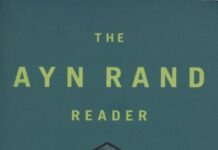
Ebook Info
- Published: 1990
- Number of pages: 370 pages
- Format: EPUB
- File Size: 0.46 MB
- Authors: Ayn Rand
Description
Between 1961, when she gave her first talk at the Ford Hall Forum in Boston, and 1981, when she gave the last talk of her life in New Orleans, Ayn Rand spoke and wrote about topics as varied as education, medicine, Vietnam, and the death of Marilyn Monroe. In The Voice of Reason, these pieces, written in the last decades of Rand’s life, are gathered in book form for the first time. With them are five essays by Leonard Peikoff, Rand’s longtime associate and literary executor. The work concludes with Peikoff’s epilogue, “My Thirty Years With Ayn Rand: An Intellectual Memoir,” which answers the question “What was Ayn Rand really like?” Important reading for all thinking individuals, Rand’s later writings reflect a life lived on principle, a probing mind, and a passionate intensity. This collection communicates not only Rand’s singular worldview, but also the penetrating cultural and political analysis to which it gives rise.
User’s Reviews
Reviews from Amazon users which were colected at the time this book was published on the website:
⭐This book is a collection of Essays and articles that Ayn Rand wrote.Ayn Rand (1905 – 1982) immigrated from Russia to the United States and supported the philosophies of its founding fathers. Her main philosophy is the freedom of the individual. She is against any government control of the people. Only when the people are given freedom can a nation thrive. Ayn Rand was puzzled at how Americans took this freedom for granted, and some even opposed it. She believed that America has distanced herself from the beliefs of its founding fathers.”Who is the Final Authority in Ethics?” Ayn Rand argued that morality is part of life so to speak, and it is there for all of us to grasp, and therefore should not be dictated by religion, politics, government or any other controlling agency.Rand held that the only moral social system is laissez-faire capitalism. Contrary to what most believe (or want us to believe), Rand was against monopolies.Though many admired Ayn Rand for her philosophies and concern for the individual (harming an individual for the good of the many is not justified), many opposed her. Noam Chomsky declared Rand to be “one of the most evil figures of modern intellectual history.” Conservative commentator William F. Buckley declared: “Ayn Rand is dead. So, incidentally, is the philosophy she sought to launch dead; it was in fact stillborn.”Rand firmly believed in the philosophy of Aristotle (and was very influenced by it), and argued that many scholars throughout the ages have changed the meaning of Aristotle’s philosophy to advance their own agendas. I found this quite intriguing. Though I read Aristotle back in school, I honestly cannot remember his philosophy. I can’t wait to delve back into Aristotle’s writings.Rand was an atheist, and she criticized religion (for it controls the individuals), but encouraged altruism. Religion therefore should be a means of doing good and being kind to one another, but without the control it places on individuals. Believing in God places control on the individual’s life.She is known for her best-selling novels and for developing a philosophical system called Objectivism. The essence of Objectivism is “the concept of man as a heroic being, with his own happiness as the moral purpose of his life, with productive achievement as his noblest activity, and reason as his only absolute.”Ayn Rand has some really thought provoking ideas. In her book `Atlas Shrugged,’ she wrote, “The entire history of science is a progression of exploded fallacies, not of achievements.” She also asked, can we change the world, or is everything is as it should be? In other words, can we change ANYTHING around us, or do we merely think we can change (or have changed) it by taking already existing paths? Interestingly, in many religions, including all three major monotheistic religions–Christianity, Islam, and Judaism–on the creation of the world, God said to the universe be, and it was. If we follow this beginning, then everything is and always has been. In other words, we cannot change anything but merely go on the many paths available to us (and this makes us think that we have changed something). I find this idea very interesting.This book is an excellent introduction to Rand’s philosophy. I did find some articles confusing and hard to read and understand. This book isn’t an entertaining read, but rather an informative and though-provoking book to read like a textbook.
⭐This is an excellent collection of essays that should be included in the library of every fan of Objectivism, the philosophy of Ayn Rand. This book contains several great essays by Ayn Rand, which include her thoughts on abortion, the Apollo missions, Vietnam and working for the government. This collection also includes several insightful higher level philosophical essays including the following:* “Who is the Final Authority in Ethics?” where Ayn Rand clarifies that morality ultimately stems from facts of reality, not from a religious, political or legal authority* “The Sanction of the Victims” where Ayn Rand emphasizes the importance of never voluntarily relinquishing any of your rights or accepting unearned guilt.Most importantly, I think the contributions in this volume that are not by Ayn Rand are also incredibly valuable. These include:* “Religion vs. America” where Dr. Leonard Peikoff almost prophetically warns of the increased blending religion and politics (this is published in 1990).* “The American School: Why Johnny Cannot Think” where Dr. Peikoff analyzes how public schools teach children to not think in principles or develop proper concepts but instead teach children to be concrete-bound and develop short-term pragmatic solutions to complex problems.* “Medicine: The Death of a Profession” where Dr. Peikoff articulates how health care is not a right and how the increased government involvement in health care will slow advancements in medicine to a crawl.* “Libertarianism: The Perversion of Liberty” where Peter Schwartz delineates the stark differences between the views of the Libertarian Party and the philosophy of Ayn Rand.Although I think this book is definitely accessible to all, I think that those who are just getting familiar with Ayn Rand’s non-fiction works will find many of the essays in both The Virtue of Selfishness and Capitalism: The Unknown Ideal to be more interesting places to start.
⭐This is a Must Read book for anyone who has an interest in our culture and holding our economy together. If you don’t read it you will be sorry you missed out.
⭐These eloquent essays show how to apply reason to make sense of current events which can otherwise seem incomprehensible. While the essays in this book were written in the 1960s through the 1980s, the ideas that they cover are as relevant today as they ever have been.
⭐Whether you are an avowed Objectivist or someone looking to read something new, interesting, challenging and life changing then this is the work for you. With over 30 essays spread across 300 pages, Rand and company analyze, discuss, and prove in every case the power and supremacy of reason and the nature of man’s rights as an individual. While this work was compiled and completed after Rand’s death, the entire collection of essays is still relevant and steeped {as the title states} in Objectivist thought.I highly highly recommend reading this and all of Rand’s works to change your life
⭐This compilation of wonderful essays enables the reader to get inside the powerful mind of Ayn Rand. There are two outstanding essays: the first one is ‘The intellectual bankruptcy of our age’ a must read for any well intentioned liberal, the second one is Leonard Peikoff’s ‘My thirty years with Ayn Rand’ this last essay is one of the most beautiful and encouraging things I’ve read in my life.While people deny Ayn Rand and forbid any kind of memorial to her, this book is a monument to a brilliant woman who is not to be forgotten.
⭐I really liked how Rand starts all the way from the beginning of critical thought and moves through to modern day (1960s) political ideologies. The ideas covered in this book are so fundamental that you’ll swear they were written to explain today’s political problems.
⭐I’ve not read the whole book yet – it’s deserving of more thought than just rushing through it – but already it’s removed the proverbial brick wall I felt I was hitting my head against with regard to ‘am I the only one thinking altruism is unhealthy for mind and body?’ Maybe I’ll disagree with some of it, maybe I won’t – but that’s the thing about objectivism as I understand it – I get to have my own opinion without fear of expressing it. The ‘rational’ way of thought can change your life for the better.
⭐Ayn Rand is perhaps one of the most mis-quothed and misunderstood thinkers ever. That is no exaggeration. Her ideas are often taken out of context, misapplied and then burnt and ridiculed for the straw-men they are. Few of her critics in academia, journalism or the lay-public at large have ever read beyond Atlas Shrugged (even then they read it in secondary school and we all know how THAT can suck the life out of any great piece of literature), but frankly if you want to truly understand Rand you have to read beyond the fiction. Only the most dedicated of thinkers could pry out the essentials from her novels in toto and really, who wants to do that? Who has the time to devote hours upon hours dissecting John Galt’s epic monologue? Or d’Anconia’s speech on Money (as excellent as those two bits of prose are…)?. No, what people need and want is the bare-bones of her argument presented succinctly and then fleshed out. Books such as The Virtue of Selfishness, and Capitalism; The Unknown ideal are examples of her more well-known essay collections, but others such as The Romantic Manifesto and The Return of the Primitive are less well known. The Voice of Reason is perhaps her least known collection of essays, which, unfortunately, is a great shame since it remains one of the easiest introductions to her thought and fleshes her ideas out amongst a number of different but interconnected topics. Objectivism is not an easy philosophy to know, many have been lulled into a false sense of knowledge believing her to be simple; to some this appeals to the adolescent desire for clarity and black and white, to others this serves only to prove their prejudices correct – to them she really is a one trick pony. Namely many get stuck on her treatment of ethics and politics, she proposed egoism and laissez-faire capitalism respectively. The problem of course being many people “know” what Egoism and Capitalism entail (hedonism and greedy bankers, monopolies and cartels, right?).To the youthful radical her egoism appeals to the egocentric nihilism of youth. A desire to care only for oneself. A natural reaction to the often suffocatingly vapid enforced altruism of state schooling we are all subjected to. The Capitalism side appeals to a desire to shirk all responsibility for others and simply pursue ones desires free from other people. This, of course, is a shallow, childish view of her philosophy and is akin to saying Aristotle said we should all use logic – and leaving it at that! Unfortunately many of her critics choose not to move beyond this analysis – having learnt all they needed to reinforce their own philosophies (or lack thereof) they type-cast her as some sort of crypto-fascist nut job and wash their hands of her! Big mistake! A deeper, more honest and committed analysis of Rand reveals a layered, nuanced and subtle philosophy that is a far cry from the hedonism of youth. Though this book stays away largely from her metaphysics, epistemology and aesthetic theory it does touch on it in important ways (though I recommend Introduction to Objectivist Epistemology for a deeper view of her Epistemic Theory – it’s mind blowing!), but most importantly this book will give you concrete examples of how her sometimes complex theory can be applied. I recommend this book to those who have read some of her fiction and essays and want to broaden their repertoire, but I also recommend this book for those who write her off as a hack. This book might change your mind about her approach.
⭐Excellent
Keywords
Free Download The Voice of Reason: Essays in Objectivist Thought (The Ayn Rand Library) in EPUB format
The Voice of Reason: Essays in Objectivist Thought (The Ayn Rand Library) EPUB Free Download
Download The Voice of Reason: Essays in Objectivist Thought (The Ayn Rand Library) 1990 EPUB Free
The Voice of Reason: Essays in Objectivist Thought (The Ayn Rand Library) 1990 EPUB Free Download
Download The Voice of Reason: Essays in Objectivist Thought (The Ayn Rand Library) EPUB
Free Download Ebook The Voice of Reason: Essays in Objectivist Thought (The Ayn Rand Library)



